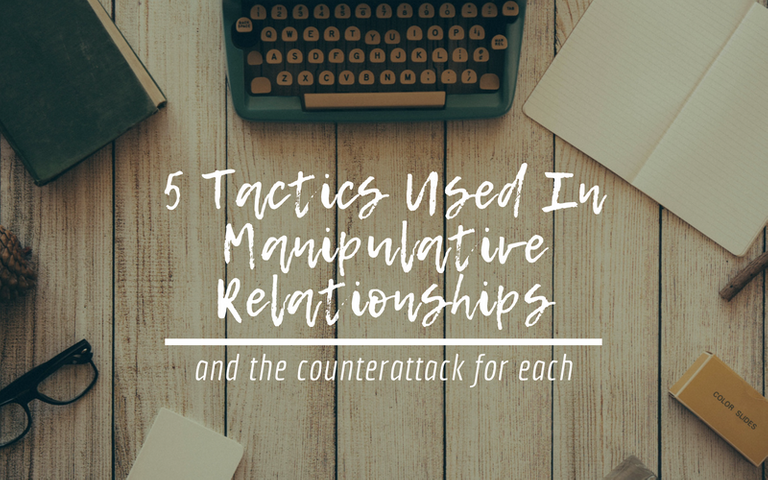
Perhaps you've been waylaid by one of these sneak attacks or been called out for using one of them, but these tactics can be tricky to identify. They are slanderous and usually found in manipulative relationships. When they catch you off guard, it can be difficult to know how to respond in a way that is loving and God-honoring.

In the moment, these attacks are alarming, frightening, and especially disheartening when they come from a brother, but God's Word gives us the reassurance we need to counter them. He is our strong tower, and when we run to Him through prayer and reading His Word, we find tools to help us in our time of trouble. So here are five of the tactics, along with "counterattacks" that we can employ for the benefit of our brother and to the glory of God.
Introductory notes:
I use the word "counterattack" because we are responding to sinful attacks and must counter them. However, the purpose is not to destroy our brother or sister, but to either deflect the blow or put a fatal end to the slander/manipulation.
Most of the credit for this post needs to go to my husband who loving points out the tactics being used against me, and then patiently corrects my natural, sinful responses to those tactics. And to the other mentors who have guided me in godly wisdom through manipulative relationships.
1. Gather the witnesses, but keep them blindfolded
I wouldn't have thought to include this particular tactic except that it has happened to me twice and caught me off guard both times. Because the first case had particularly painful consequences, I addressed it differently the second time and with better results.
Emails are a regular part of our daily life, but unlike letters, we don't always know who else has seen what we thought was written specifically to us. Twice I've discovered that an email written to me was blind-carbon-copied (bcc'd) to a list of others. In a business organization, this might be normal practice to make sure others are up-to-speed on the situation. Unfortunately, in the cases I'm referring to, the writer was calling on others to act as "witnesses," but because they had been blind-carbon-copied, there was no way for my response to reach them. They were being called on to assess the situation but only hearing one side of it.

I'll address the contents of those emails as a separate tactic (#2), but in short, both emails attributed false motives to the decisions I'd made.
Counterattack: Call it out
In the first instance, I replied directly to the writer, clarifying the reasons for my decisions. It was only after-the-fact that I found out that others had read the email addressed to me. By then, they believed that what had been said was true and they never had the benefit of seeing my response. To this day, I have readers of that email holding me accountable for things that the email said were true, but which were in fact false. Even when the writer acknowledged to me that they'd been wrong, they didn't inform the "witnesses" they'd included in the original email.
The second time, I discovered that the email was blind-carbon-copied before I wrote my response. After laying out the false accusations of their email, I asked the writer to forward my response to the same people they had previously blind-carbon-copied. I pointed out that to not do so would be slanderous. They had presented their perspective, which contained untrue information but which the readers may believe to be true. In the end, my reply was forwarded and the witnesses were left to decide for themselves, rather than be pulled onto one side.
Be encouraged
Though this tactic, like the others below, is meant to silence us, we need to remember that God has given us "a spirit not of fear but of power and love and self-control" or a sound mind (2 Timothy 1:7). We can show our brother their fault and entreat them to correct their mistake. We can also entreat those who are being used as "secret" witnesses and give them the benefit of the truth.
Paul writes to the proud Corinthians, "You are held in honor, but we in disrepute ... When reviled, we bless; when persecuted, we endure; when slandered, we entreat. We have become, and are still, like the scum of the world, the refuse of all things." (1 Corinthians 4:10-13) Finding out that others are slandering you may make you feel like the refuse of all things, but be encouraged, you are not the first! Trust the One who has made you clean, who knows all things, and with Whom nothing is hidden.
2. Implied motivations
As mentioned above, the contents of the emails were themselves a tactic, deserving of the special forces. I've had the same tactic utilized against me in face-to-face conversation, so the counterattack can apply to both.
What does the "implied motivations" attack look like? It strives to designate motivations or emotions to your decisions, even though you never gave any. For example, you decide to remove yourself from a group and inform the leader that you'll no longer be attending their meetings. Without asking you why, she responds, "I'm sorry you feel so ______ that you can't participate anymore." If you're not expecting this, you might find yourself speechless, wondering if you really have those feelings and if that's the reason why you aren't participating. Or if you're worried about offending this person, afraid that they'll be upset or think less of you for leaving, you may begin sharing your reasons although you had no intention of doing so.

Perhaps they use a slightly more vicious attack. "Well! That's very selfish of you. I can't believe you'd leave us when you know we're trying to do so much good." If you're like me, then you stammer, look down, feeling guilty. Or perhaps you get angry and retort back. Most likely, our first response comes out of a spirit of fear - fear of letting others down, fear of being put down, fear of having someone else's words control you.
But what is the counterattack we can utilize, having a spirit of power and love and a sound mind?
Counterattack: Disengage the lie
The Proverbs remind us, "There is one whose rash words are like sword thrusts, but the tongue of the wise brings healing." (Proverbs 12:18)
We need to be wise and bring the truth into this situation. Instead of getting caught up in the lie or arguing against it, we need to point it out. "That's not what I said. That's not how I feel or why I'm leaving. You are saying something untrue."
This counterattack is, first of all, gracious to the speaker. When we don't point out the lie, the speaker is allowed to remain in it. The tongue of the wise brings healing. Pointing out the lie allows them to repent and be restored. Secondly, we don't let the sword thrust hit its mark. When we counter-attack, we disarm the speaker and exercise wisdom. We aren't manipulated into saying what we don't intend. And we kill the lie.
"Truthful lips endure forever,
but a lying tongue is but for a moment."
- Proverbs 12:19
3. Pass along the guilt
"I used to do this ... but now I cringe when others do it ..."
I recently read something to this effect in a blog. It didn't sit right, but it took me some time to realize that they were trying to manipulate me with their own guilt, and by implying that others who continue doing what is "cringe-worthy" are foolish or shameful.
I realized this tactic has been used on me in personal conversations as well. And I wouldn't be surprised if I've used it myself! We want others to take our side, so we play on their emotions. Guilt and shame are strong feelings that ought to drive us to God, but we take advantage of them and use those emotions to our benefit.
Counterattack: Go back to the reason
If you are in conversation and this happens, I'd encourage you to counterattack and be a blessing to your brother or sister. Ask them why they felt guilt or shame in the first place. Show them that guilt and shame can only find relief in the gospel ... not in getting others to go our way. And if you have a close enough relationship with the individual, you may even point out to them that putting their guilt on others is enslaving and manipulative!
They may have a valid argument for why something is wrong, but it needs to come from the Word of God, our ultimate source of truth. If it comes from their own misgivings and doubts, then it has no authority.
4. The hanging accusation
This attack is perhaps the hardest to address. The luxury of short tweets and Facebook comments also makes it especially prevalent. We post a picture of our evening out and wake up the next morning to find a comment. We open it eagerly only to read, "I wish I could have had a night off."
We scratch our heads, wondering why they wrote that. We feel a bit guilty, promising ourselves never to post anything fun. Or maybe we write, "get over yourself" and unfriend them. Either way, we've been manipulated into feeling guilt or reacting in anger (note: even if we've been manipulated, both false guilt and anger are sinful responses for which we are accountable).
Additionally, an accusation is left hanging that implies that we've been unthoughtful or uncaring to another's plight.
The difficulty with these hanging accusations is that we don't know the heart of the speaker, and they often occur in public settings.

You may choose to ignore the comment, but if you see this as an opportunity to bless your brother or sister, you may wish to counter their attack.
Counterattack: Ask questions or take away the sting
The Proverbs remind us, "a soft tongue will break a bone." (Proverbs 25:15b)
A soft tongue may mean following Christ's example and asking questions: "Why do you say that?" "Why can't you go out?"
It may also mean expressing heartfelt sympathy and seeking to understand their situation. "I'm sorry you haven't been able to get a night off." Through kind words, you can take the sting out of their words.
"Do not repay evil for evil or reviling for reviling, but on the contrary, bless, for to this you were called, that you may obtain a blessing." (1 Peter 3:9)
5. Sending the messenger ... or being the messenger
This is an insidious tactic because it draws others into the slander and uses them to manipulate the situation. Have you ever met up with an acquaintance you haven't seen in awhile only for them to start in with, "I saw so-and-so the other day and they said that you ... I just thought you should know"? Depending on your relationship with them, they may be even more upfront. "I heard from so-and-so that you ... and I wanted to tell you that I'm really disappointed you'd do something like that. I really think you should ..." They've formed a judgment about what so-and-so said you did and have now come to give you their piece of mind.
Counterattack: Take the message but reply to the sender
The difficulty with this one is that you're dealing with the middleman. The slanderer has already caused mischief and now someone else is ensnared in it. Since this person has revealed their inclination to gossip, it's better not to defend yourself to that person or give them any more information about the situation. Instead, remove yourself from it and direct their attention to the role they're playing. For example:
"I'm sorry you had to come and tell me that. So-and-so never said those things to me. I will contact them and see what they were referring to. I think it's better I deal with them directly. The Bible instructs us to go to our brother first, so if they happen to mention anything to you again, perhaps it'd be better if you encourage them to come and tell me directly."
You're lovingly reminding them that tale-bearers and gossipers aren't peacemakers. And that God gives us instructions for when we have a problem with our brother or sister.

When you contact "so-and-so," it's good to remind them of that as well. But first, be sure to ask questions and not just assume that your acquaintance had all the facts correctly. "I met ___ and they said you were upset by something I did/said. I just wanted to contact you and see if there wasn't some mistake since you hadn't mentioned anything to me."
Or, if they have already discussed the problem with you and you've reached reconciliation, you may need to either go back over the problem again or request that they not continue spreading their discontentment when the issue has been settled.
Self-evaluation: Lay down your weapons
Now, let's go a bit further. Do we use any of the tactics mentioned above to manipulate others? Perhaps it seems harmless enough, but remember Christ's words:
“You have heard that it was said to those of old, ‘You shall not murder; and whoever murders will be liable to judgment.’ But I say to you that everyone who is angry with his brother will be liable to judgment; whoever insults his brother will be liable to the council; and whoever says, ‘You fool!’ will be liable to the hell of fire." - Matthew 5:21-22When you manipulate others, even subtly or unintentionally, you are essentially killing them. Your slander and insults will receive the same judgment as those who murder.

And if you pretend that you haven't "really" wronged your brother, remember what Jesus says next:
"So if you are offering your gift at the altar and there remember that your brother has something against you, leave your gift there before the altar and go. First be reconciled to your brother, and then come and offer your gift. Come to terms quickly with your accuser while you are going with him to court, lest your accuser hand you over to the judge, and the judge to the guard, and you be put in prison. Truly, I say to you, you will never get out until you have paid the last penny." - Matthew 5:23-24Your brother may not bring you before a physical judge or court, but you will be brought before a spiritual one. Your prison will be of your own making as you destroy relationship after relationship and find yourself hiding from those you've manipulated. But don't despair. There is forgiveness with God. Seek His mercy first and then go, be reconciled to your brother.
Are you in a manipulative relationship? Don't be afraid.
When faced with manipulative and slanderous tactics, it's hard not to react in fear. Fear can cause us to feel false-guilt or act out in anger. Both of these are sinful responses. Remember that we have an Advocate with the Father who is interceding for us. We don't need to be afraid that these tactics will hold any weight in His court. Apply the defenses His Word gives us to shield yourself.Using these counterattacks may also protect your brother from their own self-destructive maneuvers. It's likely that they find themselves in multiple manipulative relationships and don't know how to get out. Your stand for truth may be the very kindness that shows them their use of manipulation. May God guide you and give you wisdom!
Posted from my blog with SteemPress : http://reformedexpressions.com/tactics-of-manipulative-relationships/
Thank you for your post. :) I have voted for you: 🎁! To call me just write @contentvoter in a comment.
Congratulations @ironmanmatt! You have completed the following achievement on Steemit and have been rewarded with new badge(s) :
Click on the badge to view your Board of Honor.
If you no longer want to receive notifications, reply to this comment with the word
STOPTo support your work, I also upvoted your post!
Do not miss the last post from @steemitboard:
SteemitBoard World Cup Contest - The results, the winners and the prizes